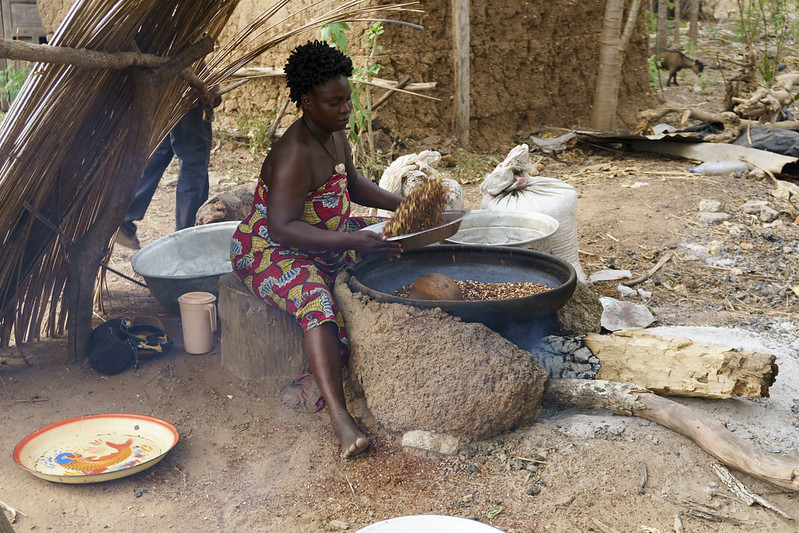Hunger in Benin
 The Republic of Benin, a former French colony, is a coastal West African country with a 2024 population of over 14 million, equally distributed between urban and rural areas. Just under two-thirds of the population is under the age of 25.
The Republic of Benin, a former French colony, is a coastal West African country with a 2024 population of over 14 million, equally distributed between urban and rural areas. Just under two-thirds of the population is under the age of 25.
Benin’s most recent poverty rate measured by the international poverty line ($3.65) is only 12.7%, but as measured by the national poverty line, over a third (36.2%) of the population is considered to be poor. The urban-rural poverty gap saw a 10% difference (40.6%-30.8%) at the last assessment, with significant regional, gender, age and sociodemographic disparities.
Background
Benin ranks 91 out of the 125 countries in the 2023 Global Hunger Index, its score of 22.6 putting it in the “Serious” category. This score is an improvement from 33.9 in 2000. The measured indicators of undernourishment, child mortality and child wasting are now all at or below 10%, but child stunting remains over 30%. Child stunting measures the proportion of children under five with low height for their age, which reflects chronic undernutrition.
Benin exemplifies some of the successes that international organizations and state governments have had in collaborating with Benin’s leadership to create positive change. Key players in Benin’s fight against hunger include the nonprofit The Hunger Project, the U.N.’s World Food Programme and the World Bank.
The Hunger Project in Benin
The Hunger Project (THP) has been working in Benin since 1997 to fight hunger and poverty. THP’s approach to rural development is the “Epicenter Strategy,” where they partner with individuals and communities to achieve sustainable self-reliance. In Benin, THP established 18 epicenters in eight of the country’s twelve departments, sixteen of which have already declared self-sufficiency. The strategy begins by empowering women as change agents, mobilizing people to build individual capacity, leadership and confidence, and then creating partnerships with local government. Nutrition programs achieve synergy with farming and food security and multiple other programs, including health, water and sanitation, education, adult literacy and microfinance.
In 2023, THP initiated four new projects in Benin’s central and northern regions as part of a vision for 2027 to improve nutritional and food security. THP’s mission to empower youth, women and other vulnerable groups is targeting the 450,000 residents in rural Benin.
WFP’s Role in Alleviating Hunger in Benin
The U.N.’s World Food Programme reports high food insecurity in Benin, noting that almost 83% of households cannot afford a healthy diet. WFP began its support in Benin in 2017 by initiating integrated school feeding programs in 75% of Benin’s public primary schools. The Government of Benin is committed to full coverage, allocating $200 million for a five-year program cycle.
At its November 2023 Executive Board session, WFP approved a three-year country strategic plan for Benin (2024-2027), based on Benin’s own 2021-2026 national action plan. Continuing the national school feeding program, along with policy advisory work and technical assistance, three outcomes are WFP’s focus: Meeting urgent food and nutrition needs by people affected by global, regional and climate shocks; enhanced nutrition, health and education for communities and school-age children through access to basic social services and affordable, nutritious diets; and increased capacity of targeted systems and institutions to implement programs that promote food security and nutrition. It is intended that the strategic plan will contribute to the achievement of multiple Strategic Development Goals, including SDG 1 (No Poverty) and SDG 2 (Zero Hunger).
World Bank Group Support in Benin
The World Bank Group established a Country Partnership Framework with Benin covering 2018-2023, with a new CPF to begin this year (2024-2028). The World Bank Group’s commitment of $2.7 billion finances seven regional and 19 national projects. COVID-19 responses included activation of the Emergency Response Component of the Early Childhood Nutrition and Development Project.
In June 2024, the World Bank approved $150 million in additional International Development Association support to improve Benin’s food security and productivity through increased production of market garden produce and rice, as well as support for various agricultural supplies, production technologies and advisory services. The World Bank country manager for Benin reports that two-thirds of Benin’s population is employed in agriculture so investment in this sector is “an important pillar for food security and a key driver of fragility prevention mechanisms.”
– Staff Reports
Photo: Flickr
Updated: August 24, 2024
